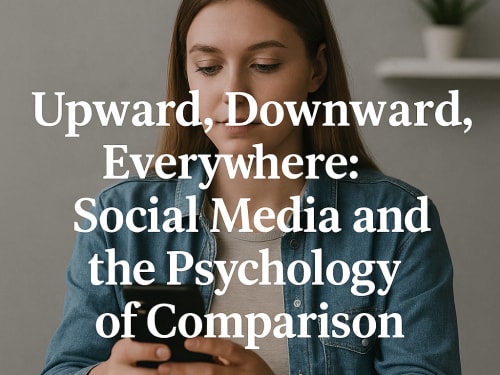Upward, Downward, Everywhere: Social Media and the Psychology of Comparison

posted 10th September 2025
Upward, Downward, Everywhere: Social Media and the Psychology of Comparison
With the rise of social media platforms like Instagram and Facebook, it’s easier than ever to compare our lives with others. Whether it’s friends, strangers, or celebrities, these often unconscious comparisons can sometimes inspire us, but more often they leave us feeling worse about ourselves.
These endless streams of posts, stories, and tweets create open windows into other people’s lives, inviting us to engage in what psychologists call social comparison. More specifically, we often find ourselves caught between upward comparisons(measuring ourselves against those we see as “better off”) and downward comparisons(looking at those we perceive as “worse off”).
What is Social Comparison Theory?
Social Comparison Theory, first introduced by psychologist Leon Festinger in 1954, posits that we naturally compare ourselves to others, whether in terms of success, appearance, skills, or opinions. In other words, other people become the yardstick by which we judge our own lives.
With social media constantly showcasing the highlights of others’ experiences, this tendency has only intensified, leaving us more vulnerable to unfair and unhelpful comparisons. The problem is that what we see online is rarely the full picture. Instead, we’re met with carefully curated posts, polished photos, and glamorous snapshots that present an idealised version of reality. These highlight reels can make life seem effortless for others when, in truth, much of it is staged, filtered, or selectively shared. Comparing ourselves to these unrealistic portrayals can fuel feelings of inadequacy, anxiety, and low self-esteem.
Recent Studies and Long-Term Effects
Recent research shows just how powerful social media can be in shaping how we think and feel. A 2024 systematic review in Social Science & Medicine found that exposure to idealised influencer content worsens body image and mood, while influencer marketing of unhealthy foods led children to consume significantly more calories. This highlights how online comparisons aren’t just about perception; they can also affect our behaviour and health in measurable ways.
Building on this, another study found that social comparison and mindless scrolling were the strongest predictors of depression among adolescents. Over time, these behaviours can leave young people feeling drained, inadequate, and low, not just fleeting emotions, but experiences that can have a meaningful and lasting impact on mental health (Twivy et al., 2025).
Interestingly, not all comparisons on social media are harmful. In fact, recent research reveals an interesting twist: seeing travel posts online doesn’t just spark envy, it can actually increase our desire to travel. The study found that envy acts as a bridge between what we see and what we want, meaning the more envious we feel, the stronger our intention to pack our bags (Zeynep Ekmekçi, Erkan Güneş, and Muhammed Taş, 2025).
Social media can be a double-edged sword. Endless scrolling and comparing yourself to others can harm mood, body image, and even mental health, but not all comparisons are bad. Sometimes, seeing what others do, like travel posts, can inspire and motivate us. How it affects us depends on how we engage with it.
What’s Next?
Understanding how social media affects us is the first step, but the real question is: what can we do about it? Here are some practical strategies to protect your well-being and make social media work for you:
Be mindful: Notice when you’re comparing yourself or scrolling out of habit, and take breaks when needed.
Curate your feed: Follow accounts that inspire or uplift you, rather than those that trigger envy or negative comparisons.
Limit scrolling: Set time limits or schedule phone-free periods to reduce passive consumption.
Reflect, don’t react: Pause when you notice feelings of inadequacy or envy, instead of reacting impulsively.
Engage positively: Use social media to learn, connect meaningfully, and celebrate your own progress.
By being aware of how social comparison works online and taking small, intentional steps, you can reduce negative impacts and even use social media as a source of inspiration and growth.
Don’t let curated lives dictate your happiness; use social media on your terms!
Reference list
Powell, J. and Pring, T. (2023). The impact of social media influencers on health outcomes: Systematic review. Social Science & Medicine, [online] 340(340), p.116472. doi:https://doi.org/10.1016/j.socscimed.2023.116472.
Twivy, E., Freeman, D., Anderson, C., Loe, B.S., and Waite, F. (2025). The social media scale for depression in adolescence. International Journal of Adolescence and Youth, 30(1). doi:https://doi.org/10.1080/02673843.2025.2450425.
Zeynep Ekmekçi, Erkan Güneş and Muhammed Taş (2025). ‘I wish I were there’ the effect of social comparison on social media on travel intention: a parallel mediation model. Asia Pacific Journal of Tourism Research, pp.1–22. doi:https://doi.org/10.1080/10941665.2025.2546138.



